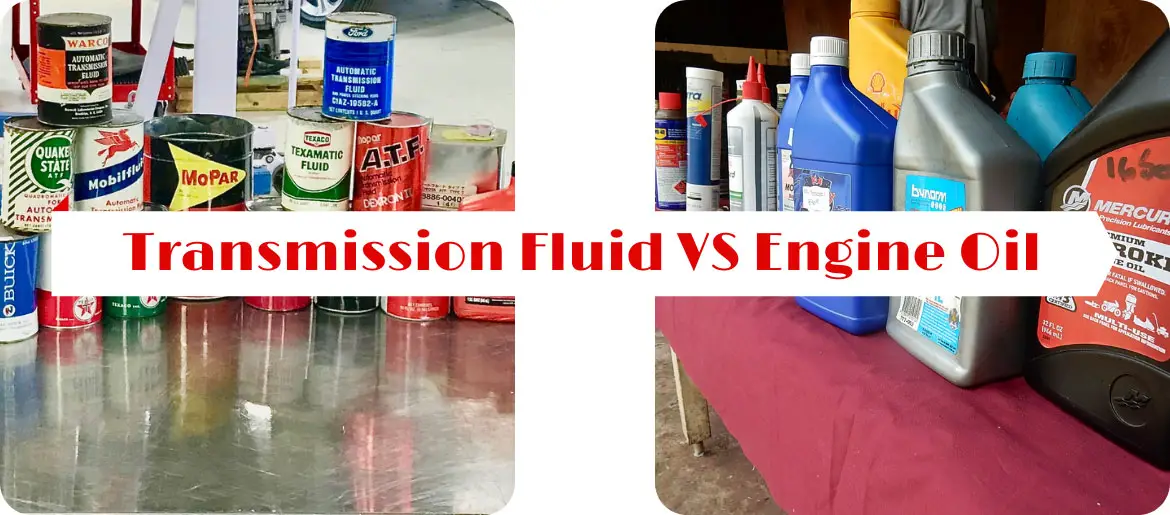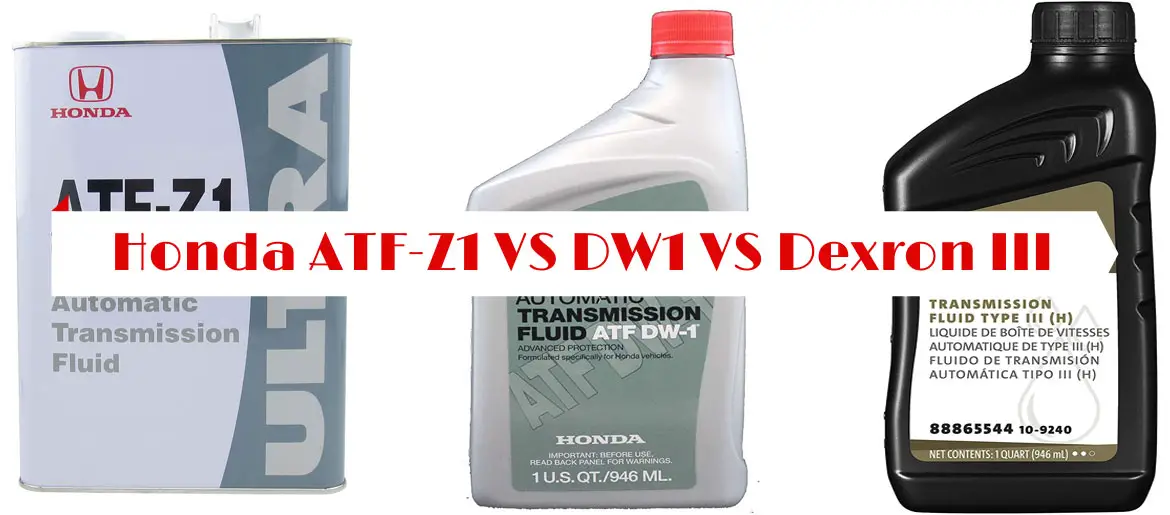Transmission Fluid VS Engine Oil | Differences You Should Know
Just how we humans require food to fuel our body for the day, cars require fluids for running at optimal performance.
If you’ve bought a new car for the first time in your life, it’s worth noting that only a single type of fluid won’t do. You will need to invest in different car fluids, including the transmission fluid and engine oil. A lot of people often mistake these fluids as the same thing, but they actually aren’t.
The major difference between them is that transmission fluid is used for a car’s automatic transmission, while engine oil is used for a car’s engine.

To simplify the functions of the two systems, an engine creates rotational power for moving the vehicle while a transmission transfers that rotational power to the wheels.
And in order for the systems to function properly, the corresponding fluids must be used. In this guide- Transmission Fluid VS Engine Oil, I have explained all the differences you should know!
Is Transmission Fluid The Same As Engine Oil?
Once again, transmission fluid isn’t the same as engine oil. They are used in different parts of a car and have different appearances, functions, and properties.
Appearance
Transmission fluid is typically red or green in color. Over time, the bright color gets darker due to the accumulation of metal debris from the transmission. As more and more debris accumulates, the fluid loses its effectiveness and eventually, fails to protect your car. Transmission fluid also has less viscosity than engine oil.
On the other hand, engine oil is amber in color having the consistency of olive oil. Like transmission fluid, engine oil can get darker over time because of contamination. Other than that, heat and additives can also result in a dark color. If the engine oil is full of contaminants, it loses its ability to lubricate the crucial parts of an engine.
Functions
The transmission plays a crucial role in moving your car. Its job is to transfer the rotational power generated by the engine to the wheels in order to move or stop the car. But, none can be done without the help of transmission fluid. It not only lubricates the components of the transmission but also acts as a hydraulic medium.
As for the engine, it is the main source of power. It burns fuel and converts the energy into mechanical power needed to move the car. In order to protect the components against wear, engine oil must be used. The primary function of the oil is to lubricate the mechanical parts.
Properties
Automatic transmission fluid contains base oil as well as additives that protect the components. It gives protection against rust, corrosion, wears, and damage due to increased temperatures. Also, it has anti-foaming properties that allow smooth distribution of the fluid to the mechanical parts of the transmission.
Engine oil is composed of hydrocarbons and additives for lubricating the engine components, protecting them from rust and corrosion, and keeping them free from sludge.
What Is The Difference Between Transmission Fluid And Engine Oil?
The main difference between transmission fluid vs engine oil is that, transmission fluid is used in the transmission system to transfer the engine generated power into wheels to run the vehicle smoothly and effectively. And the engine oil is used in the vehicle engine to lubricate the engine parts and protect the components against wear and damage.
Here is a quick comparison chat of transmission fluid and engine oil.
| Transmission Fluid | Engine Oil |
|---|---|
| It is of red or green color | It is of amber color |
| It is a lubricant that acts as a hydraulic medium | It is primarily a lubricant |
| It is typically thinner than engine oil | It is typically thicker than transmission fluid |
| It contains a high number of detergents | It contains a fair number of detergents |
| It withstands less heat than engine oil | It withstands more heat than transmission fluid |
| It does not have to be changed at regular intervals | It must be changed at regular intervals |
| It does not reduce as much with time or mileage | It reduces with time and mileage |
What Happens If You Put Motor Oil In Your Transmission?
Once you put motor oil in your transmission and rev up the engine, there’s a high chance of the components getting damaged. It’s worth noting that the extent of damage depends on the quantity of the oil you’ve poured in. Here’s what you can expect after making the mistake.

Grinding Or Shaking Sensation In Gear
Just like how the gears start grinding when the transmission fluid runs low, the same thing will happen when you use the wrong fluid. Every time you change the gears, you will experience shaking movements because of damaged gaskets.
Delayed Response
Whenever you drive or reverse gears, there can be a delayed response. You’ll need to know that the transmission is in critical condition if it doesn’t function within a minute of shifting gears.
Burning Smell
When you use the wrong lubricant in the transmission, friction between the gears causes overheating. As a result, you will experience a burning smell coming out from the car’s interior.
Noise While Driving
When you use the wrong fluid and hear noise, that’s an indication that the fluid in the automatic transmission system isn’t lubricating the components properly. Due to the lack of adequate lubrication, there will be greater friction and hence, noise.
Check Engine Light Remains Turned On
The transmission of a vehicle features sensors that indicate if there’s something that needs to be done. If you use motor oil instead of transmission fluid, the check engine light will remain turned on.
And if you’ve added motor oil in the transmission but didn’t start the engine, you can rest assured your precious vehicle will be safe. In that case, you will need to act fast before someone unknowingly revs up the engine.
What you should do is remove the transmission oil pan, fully drain out the oil, replace the filter, reinstall the pan, and then fill it with transmission fluid.
How Often Should I Change Motor Oil And Transmission Fluid?
Traditionally, it was recommended that motor oil should be changed every 3,000 miles. However, modern cars require the oil to be changed at a range between 5,000 and 7,500 miles.
As for transmission fluid, how often you need to change it depends on whether your vehicle has a manual transmission or automatic transmission system. In the case of a manual transmission system, most manufacturers recommended changing the fluid every 30,000 to 60,000 miles. For automatic transmission, 60,000 to 100,000 miles will do.
Conclusion
By reading the “Transmission Fluid VS Engine Oil” guide, you’ve probably understood that transmission fluid and engine oil are two different things that can’t be used as a substitute for each other. As long as you use the correct fluid in the correct place, there’s no need to worry at all! I hope you’ll share this guide with people who are new to the world of vehicles.
People Also Ask
Can I use motor oil for transmission fluid?
You should not use motor oil for transmission fluid. Motor oil is designed for engines, while transmission fluid is designed for transmissions. Although both are lubricants, they are not interchangeable. Transmission fluid has different properties than motor oil, and using the wrong type of fluid can damage your transmission.
What happens if you put transmission fluid instead of oil in your engine?
If you put transmission fluid into your engine instead of oil, it is likely that your engine will seize up and fail. This is because transmission fluid is not designed to lubricate engine parts. Engine oil is specifically designed to lubricate and protect engine parts from wear and tear.
What can I use in place of transmission fluid?
There are a few different fluids that can be used as a substitute for transmission fluid, but the most common is probably motor oil. Motor oil is a little thicker than transmission fluid, so it may not work as well in cold weather, but it should be fine in most other circumstances. Other fluids that can be used include power steering fluid and hydraulic oil.
Will transmission fluid clean an engine?
No, transmission fluid is not typically used to clean an engine, as there are other products that are better suited for that purpose. However, if you find yourself in a pinch and need to clean your engine with transmission fluid, it can be effective. Just be sure to flush the system thoroughly afterward to avoid any damage.




